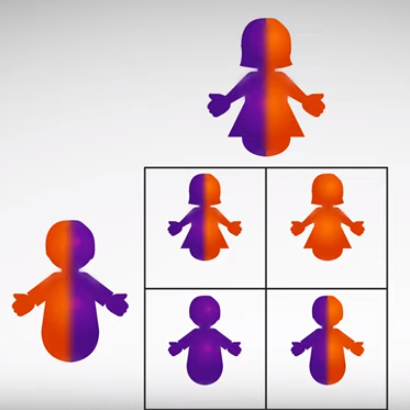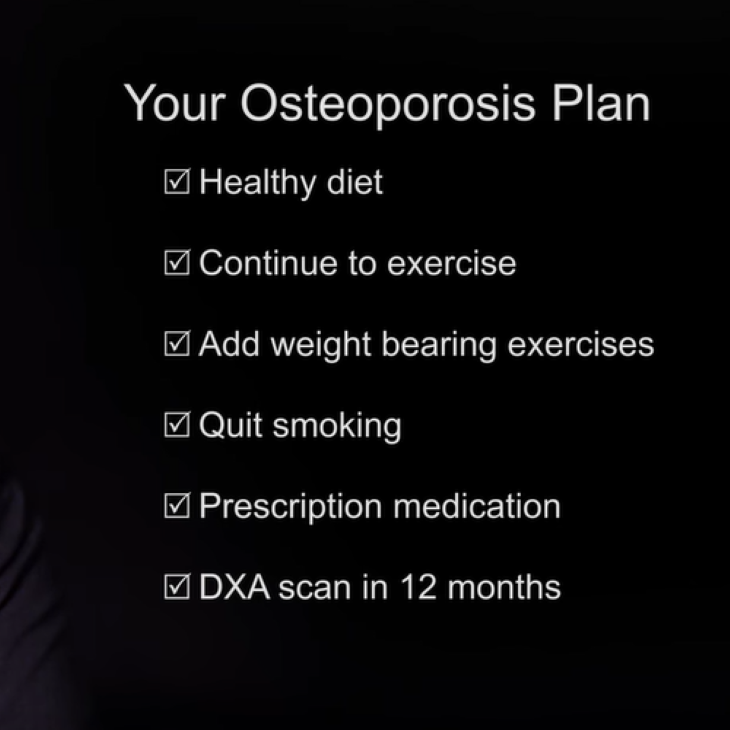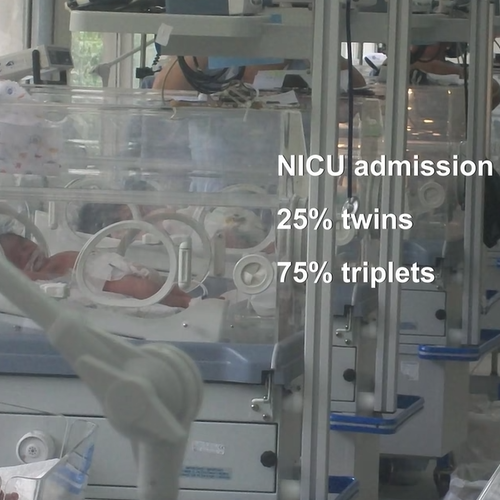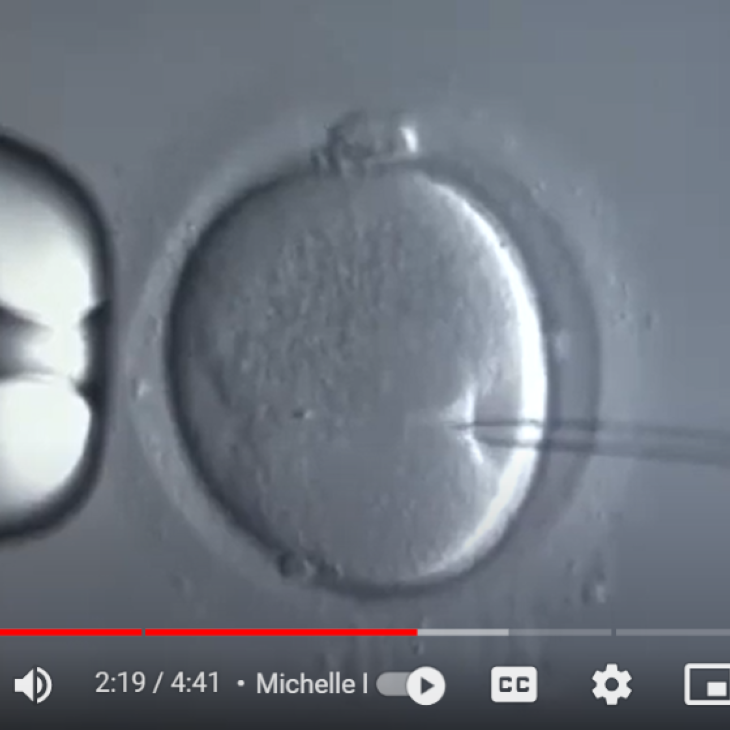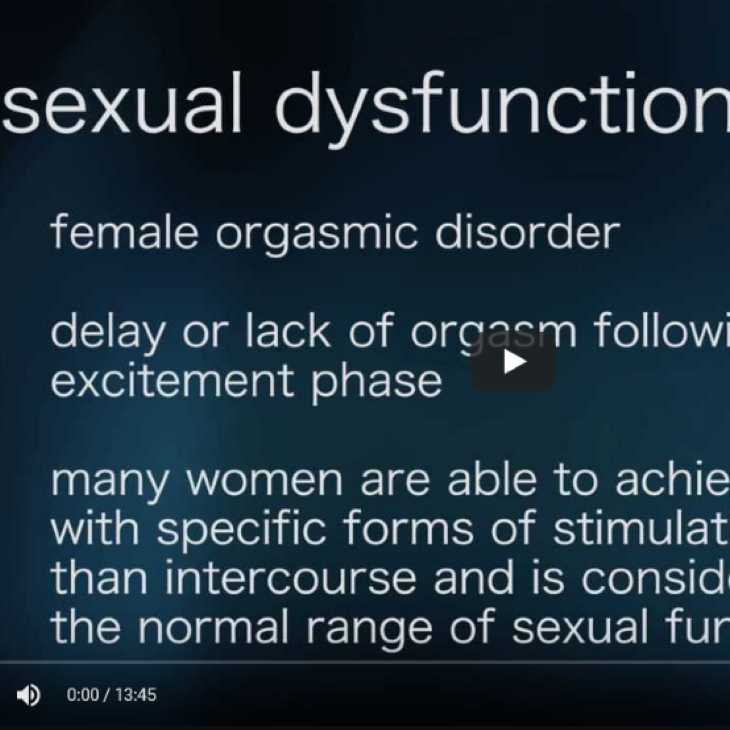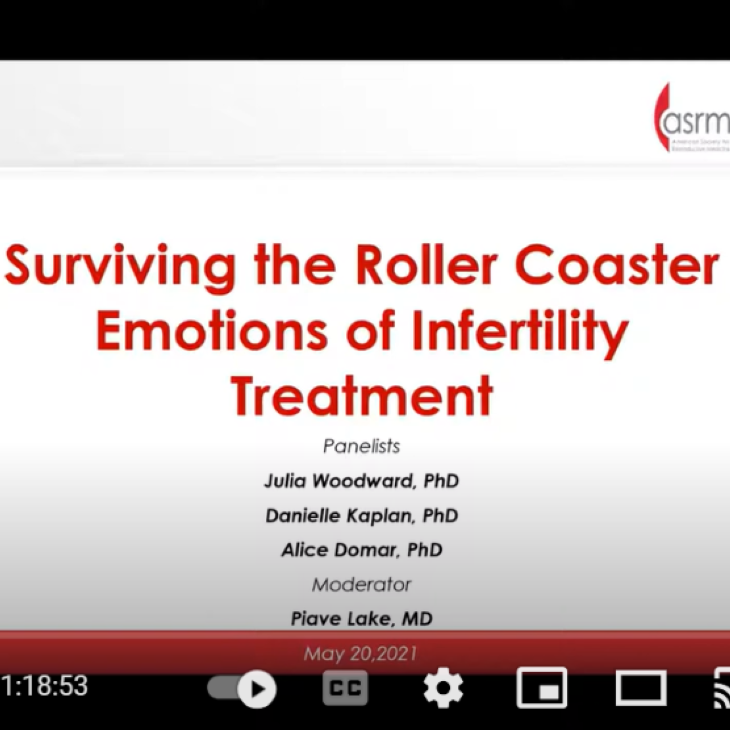Infertility
Transcript
Dr. Roger Lobo of the American Society for Reproductive Medicine discusses the various methods to evaluate infertility.
Hi, I'm Dr. Roger Lobo with the American Society for Reproductive Medicine.
Today we're talking about the diagnosis of infertility and the basic infertility evaluation when a couple does not conceive after one year of unprotected intercourse or after six months if the woman is over age thirty-five or if there are known problems with infertility.
We recommend that both partners be evaluated, but at-home questions that a woman might be able to ask herself include:
- Are my menstrual cycles regular?
- Are they coming basically every month with a little bit of variation?
- If I track my cycles, do I ovulate every month?
A board-certified obstetrician-gynecologist can provide a basic infertility evaluation and treatments. However, many causes of infertility are best treated by a board-certified reproductive endocrinologist. If there are sperm abnormalities, then the man should be referred to a urologist who specializes in male infertility.
The basic infertility evaluation for a woman looks at her ability to produce eggs and the condition and function of her uterus and tubes. A complete medical history and physical examination are important starting points. One of the first areas to check is a woman's menstrual cycles: is she menstruating regularly, and how often? This provides clues about whether she is ovulating. An over-the-counter ovulation kit can also be used to tell if her hormones are stimulating the release of eggs. Ultrasound may also be used to measure the growth of follicles.
For women who don't have regular periods, it's important to check hormone levels. When there is too little estrogen or too much of certain other hormones, ovulation can be affected. A test for ovarian reserve can check the number and quality of eggs remaining in the ovaries, which is important for the potential for a pregnancy.
Another important diagnostic test is a hysterosalpingogram (HSG). This X-ray procedure is performed to find out if the fallopian tubes are open and to see if the shape of the uterus is standard. A small tube is inserted through the cervix, and dye enters the uterus and flows out through the fallopian tubes.
Another test similar to the HSG is called a saline sonohysterogram, which uses ultrasound and a water-based solution to image the inside of the uterus.
The most basic test for male fertility is a semen analysis. Men are asked to abstain from ejaculating for two days and then collect a semen sample, usually by masturbation. Under a microscope, the number, movement, and shape of sperm are examined. If the sperm count is low, a repeat sample is requested.
When the results of all these tests are in, the couple and their physician can set up a plan for treatment or order additional tests if necessary.
To learn more, check out our other videos on fertility, including treatments for infertility.
Videos
Resources For You

Advocacy Resources
ASRM has prepared resources to help you explain and advocate for reproductive rights and the continuation of in vitro fertilization and other fertility treatments.

Frequently Asked Questions
ASRM's Frequently Asked Questions (FAQ) provides answers to common questions about reproductive health.

Patient Journeys
ASRM has resources and publications to help you through each stage of your journey.

State and Territory Infertility Insurance Laws
One way that ASRM works to improve access to fertility care is by advocating for insurance coverage for reproductive medicine care. All patients should have access to the care they need.

Fact Sheets and Infographics
ASRM produces a series of fact sheets and booklets on various topics related to infertility, reproductive health, and family planning. The fact sheets and booklets are available in English, Spanish, and Chinese.

Reproductive Rights and You
The Dobbs decision has sparked a litany of changes in state laws across the nation, and more are expected. We need your help!

Reproductive Topics
Find all the resources on a specific topic compiled onto a single page.

SART Fertility Experts Podcast
An educational project of ASRM's affiliated society, the Society for Assisted Reproductive Technology (SART), this series is designed to provide up to date information about a variety of topics related to fertility testing and treatment such as IVF.

Patient Education Videos
ASRM and its affiliated society SART have made several videos to explain the sometimes difficult topics related to reproductive medicine.

Terms and Definitions
Find explanations for the meaning behind the doctor-speak you hear when trying to research reproductive medicine topics. ASRM has defined the most popular terms in easy to understand language.

Patient Stories
Read real-life stories from patients who have faced reproductive medicine challenges and come out stronger on the other side.

Fertility in the News
ASRM Press Releases and Bulletins are published by ASRM's Office of Public Affairs to inform the world about important happenings in reproductive medicine and at ASRM.
Infertility
Follow the Science: An Evidence-Based, Science-Driven Response to Infertility
A science-based infertility evaluation and treatment guide, grounded in clinical best practices, counters ideologically driven alternatives like RRM. View the advocacy resourceASRM Ethics Committee Delivers New Opinion on Assisted Reproduction with Advancing Parental Age
ASRM Ethics Committee issues guidance on assisted reproduction and advanced parental age, addressing medical, ethical, and psychological considerations.
National Infertility Awareness Week
April 19-25, 2026, is National Infertility Awareness Week (NIAW)!
View the NIAW ToolkitSART Fertility Experts - Military Families and Fertility
Active-duty individuals in the military sometimes face unique circumstances when seeking fertility care. Learn more with a former military fertility physician. Listen to the EpisodeSART Fertility Experts - Q&A on Infertility
Infertility can create many questions for a patient. Listen to common questions and answers about infertility, egg freezing, and genetic testing. Listen to the EpisodeSART Fertility Experts - Environmental Impacts on Fertility
In this episode, the fertility experts discuss the impact of the environment, including air, climate, and chemical exposures on infertility. Listen to the EpisodeSART Fertility Experts - Recurrent Pregnancy Loss and Implantation Failure
"I can get pregnant, but I can't stay pregnant," is echoed by patients with recurrent pregnancy loss. Listen to the EpisodeSART Fertility Experts - Wellness and Fertility: Diet, Sleep and Exercise
Drs. Timothy Hickman and Rashmi Kudesia discuss the links between lifestyle and fertility. Listen to the EpisodeSART Fertility Experts - Navigating IVF as a Couple
Mary Casey Jacob, PhD is interviewed by Dr. Daniel Grow, and together they explore the emotional and practical support that couples need. Listen to the EpisodeMale Fertility Journey
About 20% of infertility cases are due to a male factor alone. Another 30% involves both male and female factors.
View the Patient JourneyFemale Fertility Journey
If you've been trying to get pregnant for more than a year, you may have infertility. Infertility is a disease of the reproductive system that impairs one of the body's most basic functions: the conception of children.
View the Patient JourneyStress and infertility
It is not clear how exactly stress impacts fertility. Read the Fact SheetHyperprolactinemia (High Prolactin Levels)
Prolactin is a hormone produced by your pituitary gland which sits at the bottom of the brain. Read the fact sheetOptimizing Natural Fertility
Before attempting pregnancy, a woman should make sure she is healthy enough for pregnancy by adopting a healthier lifestyle and taking prenatal vitamins. If she has a medical or genetic condition or risk of one, she should seek advice from a medical professional before conceiving (becoming pregnant) View the fact sheetOptimizing Male Fertility
About 20% of infertility cases are due to a male factor alone. Another 30% involves both male and female factors. View the fact sheetDefining Infertility
Infertility is “the inability to conceive after 12 months of unprotected intercourse.” View the Fact SheetFertility Rights and Responsibilities
Can a fertility program or clinic deny treatment to patient(s) if there is concern about the ability to care for the child(ren)? Yes. Fertility programs can withhold services if there are signs that patients will not be able to care for child(ren). View this Fact SheetMale Fertility Evaluation: What do I need to know?
Infertility is the inability to achieve pregnancy after one year of unprotected sex. View the fact sheetSmoking and infertility
Most people understand that smoking increases the risk for heart, vascular, and lung disease. View the fact sheetWhat are fibroids?
Uterine fibroids (also called myomas or leiomyomas) are benign (noncancerous) tumors of muscle tissue found in the uterus. View the fact sheetInfertility Counseling and Support: When and Where to Find It
Infertility is a medical condition that touches all aspects of your life. View the fact sheetWhat is In Vitro Maturation (IVM)?
In vitro maturation (IVM) is when a woman’s eggs are collected and matured outside the body. This is done as part of an in vitro fertilization (IVF) procedure. View the fact sheetSART Fertility Experts - Endometriosis
Endometriosis is a condition that can affect many facets of a person’s life, from pelvic pain to struggles with infertility. Listen to the EpisodeSART Fertility Experts - Recurrent Pregnancy Loss
Candace discusses her experience with infertility, IVF, multiple pregnancy losses and ultimately a successful delivery with Dr. Julia Woodward.Listen to the Episode
SART Fertility Experts - Financial Aspects of Infertility Treatment
“I know what treatment I want and need to do, but how can I afford it?” This is a common question infertility patients often ask themselves. Listen to the EpisodeSART Fertility Experts - Infertility Advocacy and Government Affairs
In today's episode, Dr. Mark Trolice interviews Sean Tipton about the fact that many infertility patients do not have insurance coverage for treatment. Listen to the EpisodeSART Fertility Experts - Your Infertility Nurse: Partner in Your Care
Infertility nurse practitioner and health coach Monica Moore explains the essential role of the infertility nurse in the IVF process. Listen to the EpisodeIntracytoplasmic sperm injection (ICSI)
A procedure called intracytoplasmic sperm injection (ICSI) can be done along with in vitro fertilization (IVF) if a sperm cannot penetrate the outer layer of an egg. Read the Fact SheetSART Fertility Experts - IVF: Cycles of Hope and Heartbreak
Does stress cause infertility or is it the other way round? Listen to the EpisodeSART Fertility Experts - RESOLVE and Infertility
Due to the unique stress of infertility, patients often look for resources and support in addition to those provided by their medical provider. Listen to the EpisodeWhat is Recurrent Pregnancy Loss (RPL)?
This is a condition when a woman has 2 or more clinical pregnancy losses (miscarriages) before the pregnancies reach 20 weeks. View the fact sheetSaline infusion sonohysterogram (SHG)
Saline infusion sonohysterography (SIS or SHG) is aprocedure to evaluate the uterus and the shape of the uterine cavity. View the fact sheetTestosterone use and male infertility
Testosterone (also referred to as “T”) is a hormone produced in men by the testes (testicles). View the fact sheetWhat is Premature Ovarian Insufficiency (Previously Called Premature Ovarian Failure)?
When a woman’s ovaries stop working before age 40, she is said to have premature ovarian insufficiency (POI). View the fact sheetSART Fertility Experts - Safe Surfing: The Pros and Perils of Social Media
Dr. Kenan Omurtag, MD joins host Dr. Mark Trolice to discuss the use of social media in the field of infertility. Listen to the EpisodeSART Fertility Experts - What is an REI?
These experts in infertility lead IVF programs, perform reproductive surgery, and perform research to enhance the field of reproductive medicine. Listen to the EpisodeSART Fertility Experts Teaser
Stress and Infertility
Medical procedures, cost, outcome uncertainty, and unwanted or unhelpful advice from friends and family are stressors associated with infertility treatment. Watch VideoInfertility: an Overview (booklet)
Infertility is typically defined as the inability to achieve pregnancy after one year of unprotected intercourse. View the bookletMale Fertility and Infertility - a patient education video
Male Factor Infertility is responsible for about 30% of infertility cases and can contribute infertility to an additional 20% of cases. Watch VideoInfertility
Infertility is the result of a disease (an interruption, cessation, or disorder of body functions, systems, or organs) of the male or female reproductive tract which prevents the conception of a child or the ability to carry a pregnancy to delivery. Watch VideoFibroid Tumors
An educational video that answers patient questions about the causes, symptoms, diagnosis and management of uterine fibroids. Watch VideoInfertility Treatments
Dr. Roger Lobo of the American Society for Reproductive Medicine discusses the various treatments for infertility. Watch VideoUnderstanding Fertility
In this video series, Dr. Roger Lobo explains the basics of infertility, including causes, treatments and coping methods. Watch VideoSurviving the Roller Coaster Emotions of Infertility Treatment
The experience of infertility is a rollercoaster of hope and disappointment. Treatment presents an opportunity for hope as well as a new set of challenges. Watch VideoSexual dysfunction and infertility
Sexual dysfunction is a problem in a person’s sexual desire, arousal, or orgasm. View the fact sheetCoping With Infertility
Dr. Roger Lobo of the American Society for Reproductive Medicine discusses various methods of coping with infertility. Watch VideoEndometriosis
Endometriosis is a condition in which endometrial tissue, which normally lines the uterus, develops outside of the uterine cavity in abnormal locations. Watch VideoCauses of Female Infertility
Dr. Roger Lobo, of the American Society for Reproductive Medicine explains the causes of female infertility. Watch VideoAge and Fertility (booklet)
Generally, reproductive potential decreases as women get older, and fertility can be expected to end 5 to 10 years before menopause. View the BookletCauses of Male Infertility
Dr. Roger Lobo, of the American Society for Reproductive Medicine explains the causes of male infertility. Watch VideoFAQ About Infertility
Infertility is not an inconvenience; it's a disease of the reproductive system. Learn the factsFAQ About the Psychological Component of Infertility
Infertility often creates one of the most distressing life crises that a couple has ever experienced together. Learn the factsMary Dolan's Story
Infertility Infographics
ASRM has prepared infographics to illustrate the subject of Infertility better. View the infographicsFemale Fertility
SART Fertility Experts - Fertility Myths and Realities for Black Women
Black women are more likely to experience infertility and less likely to seek and receive timely treatment. Listen to the EpisodeSART Fertility Experts - Wellness and Fertility: Diet, Sleep and Exercise
Drs. Timothy Hickman and Rashmi Kudesia discuss the links between lifestyle and fertility. Listen to the EpisodeSART Fertility Experts - Preconception Counseling
This podcast episode covers the topic of preconception counseling. Listen to the EpisodeFemale Fertility Journey
If you've been trying to get pregnant for more than a year, you may have infertility. Infertility is a disease of the reproductive system that impairs one of the body's most basic functions: the conception of children.
View the Patient JourneyStress and infertility
It is not clear how exactly stress impacts fertility. Read the Fact SheetOptimizing Natural Fertility
Before attempting pregnancy, a woman should make sure she is healthy enough for pregnancy by adopting a healthier lifestyle and taking prenatal vitamins. If she has a medical or genetic condition or risk of one, she should seek advice from a medical professional before conceiving (becoming pregnant) View the fact sheetAm I Ovulating?
Ovulation is the release of an egg from a woman’s ovaries and is essential for getting pregnant. View the Fact SheetAbnormalities of the Female Reproductive Tract (Müllerian Anomalies)
Sometimes the uterus and fallopian tubes may not form like they should. These malformations are called müllerian anomalies or defects. Müllerian anomalies may make it difficult or impossible to become pregnant. View the Fact SheetConditions Treated with Surgery on the Fallopian Tubes and Ovaries
Surgery can be used to treat problems with the ovaries or fallopian tubes, such as cysts, endometriosis, or infections. View the Fact SheetDiagnostic Testing for Infertility
An evaluation of a woman for infertility is appropriate for women who have not become pregnant after having 12 months of regular, unprotected intercourse. View the Fact SheetDilation and Curettage (D&C)
“Dilation and curettage” (D&C) is a short surgical procedure that removes tissue from your uterus (womb). You may need this procedure if you have unexplained or abnormal bleeding or if you have delivered a baby and placental tissue remains in your womb. View the Fact SheetEvaluation of the Uterus
If you haven’t been able to get pregnant after trying for 6 months, some tests can be done to help find the reason. Your doctor may test your hormone levels, your partner’s sperm, and your reproductive organs (ovaries, fallopian tubes, and uterus [womb]). View the Fact SheetFemale Cancers, Cryopreservation, and Fertility
Yes! New technology lets your doctor remove and freeze eggs, fertilized eggs (embryos), or ovarian tissue before treating your cancer. This way, you may be able to have children after your treatment. View the Fact SheetFertility Drugs And The Risk of Multiple Births
Infertility treatments that cause multiple eggs to develop make it more likely that you will become pregnant with twins, triplets, or more. This is called multiple gestation. View the Fact SheetOvulation Detection
Ovulation, the release of an egg from its follicle in one of a woman’s two ovaries, is one of the most important factors in conceiving a child. View the fact sheetWeight and fertility
One of the easiest ways to determine if you are underweight or overweight is to calculate your body mass index (BMI). View the fact sheetHypothyroidism and pregnancy: what should I know?
Hypothyroidism (underactive thyroid) is when the thyroid gland produces less thyroid hormone than it should. View the Fact SheetSART Fertility Experts - Endometriosis
Endometriosis is a condition that can affect many facets of a person’s life, from pelvic pain to struggles with infertility. Listen to the EpisodeSART Fertility Experts - IVF: Cycles of Hope and Heartbreak
Does stress cause infertility or is it the other way round? Listen to the EpisodeWhat is Recurrent Pregnancy Loss (RPL)?
This is a condition when a woman has 2 or more clinical pregnancy losses (miscarriages) before the pregnancies reach 20 weeks. View the fact sheetSART Fertility Experts - Fibroids and Fertility
Fibroids and their impact on fertility are discussed in this episode featuring Dr. Elizabeth Stewart, interviewed by host Dr. Brooke Rossi. Listen to the EpisodeInfertility: an Overview (booklet)
Infertility is typically defined as the inability to achieve pregnancy after one year of unprotected intercourse. View the bookletInfertility
Infertility is the result of a disease (an interruption, cessation, or disorder of body functions, systems, or organs) of the male or female reproductive tract which prevents the conception of a child or the ability to carry a pregnancy to delivery. Watch VideoBasic Infertility Evaluation
Dr. Roger Lobo of the American Society for Reproductive Medicine discusses the various methods to evaluate infertility. Watch VideoFibroid Tumors
An educational video that answers patient questions about the causes, symptoms, diagnosis and management of uterine fibroids. Watch VideoInfertility Treatments
Dr. Roger Lobo of the American Society for Reproductive Medicine discusses the various treatments for infertility. Watch VideoUnderstanding Fertility
In this video series, Dr. Roger Lobo explains the basics of infertility, including causes, treatments and coping methods. Watch VideoSurviving the Roller Coaster Emotions of Infertility Treatment
The experience of infertility is a rollercoaster of hope and disappointment. Treatment presents an opportunity for hope as well as a new set of challenges. Watch VideoEndometriosis (booklet)
Women with endometriosis may experience infertility, pelvic pain, or both. This booklet will describe options for diagnosing and treating pain or infertility that may be attributed to endometriosis. View the BookletCauses of Female Infertility
Dr. Roger Lobo, of the American Society for Reproductive Medicine explains the causes of female infertility. Watch VideoFAQ About Infertility
Infertility is not an inconvenience; it's a disease of the reproductive system. Learn the factsFemale Fertility Infographics
ASRM has prepared infographics to illustrate the subject of Female Fertility better. View the InfographicsOvarian Reserve Infographics
ASRM has prepared infographics to illustrate the subject of Ovarian Reserve better. View the InfographicsMale Fertility/Andrology
SART Fertility Experts - Azoospermia
Learn about azoospermia, its causes, diagnosis, and treatment options from top fertility experts. Early testing is key to effective infertility care. Listen to the EpisodeSART Fertility Experts - Wellness and Fertility: Diet, Sleep and Exercise
Drs. Timothy Hickman and Rashmi Kudesia discuss the links between lifestyle and fertility. Listen to the EpisodeMale Fertility Journey
About 20% of infertility cases are due to a male factor alone. Another 30% involves both male and female factors.
View the Patient JourneySART Fertility Experts - Urology and Male Reproductive Health
Stress and infertility
It is not clear how exactly stress impacts fertility. Read the Fact SheetOptimizing Natural Fertility
Before attempting pregnancy, a woman should make sure she is healthy enough for pregnancy by adopting a healthier lifestyle and taking prenatal vitamins. If she has a medical or genetic condition or risk of one, she should seek advice from a medical professional before conceiving (becoming pregnant) View the fact sheetOptimizing Male Fertility
About 20% of infertility cases are due to a male factor alone. Another 30% involves both male and female factors. View the fact sheetCancer and its impact on sperm, cryopreservation, and fertility
This can be confusing since the terms are often used interchangeably in the media and casual conversation. View the fact sheetMale Fertility Evaluation: What do I need to know?
Infertility is the inability to achieve pregnancy after one year of unprotected sex. View the fact sheetSperm morphology (shape): Does it affect fertility?
The most common test of a man’s fertility is a semen analysis. View the fact sheetFertility Options for Men with Spinal Cord Injury
There are several reasons a man with a spinal cord injury (SCI) might have infertility. View the fact sheetVaricocele
A varicocele is a variation of normal anatomy in which veins in the scrotum (the sac that holds the testicles) become enlarged and sometimes even visible. View the fact sheetWeight and fertility
One of the easiest ways to determine if you are underweight or overweight is to calculate your body mass index (BMI). View the fact sheetSART Fertility Experts - Male Factor
Intracytoplasmic sperm injection (ICSI)
A procedure called intracytoplasmic sperm injection (ICSI) can be done along with in vitro fertilization (IVF) if a sperm cannot penetrate the outer layer of an egg. Read the Fact SheetSART Fertility Experts - IVF: Cycles of Hope and Heartbreak
Does stress cause infertility or is it the other way round? Listen to the EpisodeFertility Options After Vasectomy
Vasectomy is currently one of the most common methods of sterilization in the United States. After your vasectomy, if you change your mind about having children, there are two procedures that can help you have a child with your partner. View the Fact SheetTestosterone use and male infertility
Testosterone (also referred to as “T”) is a hormone produced in men by the testes (testicles). View the fact sheetSART Fertility Experts - Male Fertility
Did you know that up to 40% of infertile couples suffer from male factor infertility? Listen to the EpisodeInfertility: an Overview (booklet)
Infertility is typically defined as the inability to achieve pregnancy after one year of unprotected intercourse. View the bookletMale Fertility and Infertility - a patient education video
Male Factor Infertility is responsible for about 30% of infertility cases and can contribute infertility to an additional 20% of cases. Watch VideoInfertility
Infertility is the result of a disease (an interruption, cessation, or disorder of body functions, systems, or organs) of the male or female reproductive tract which prevents the conception of a child or the ability to carry a pregnancy to delivery. Watch VideoInfertility Treatments
Dr. Roger Lobo of the American Society for Reproductive Medicine discusses the various treatments for infertility. Watch VideoUnderstanding Fertility
In this video series, Dr. Roger Lobo explains the basics of infertility, including causes, treatments and coping methods. Watch VideoSurviving the Roller Coaster Emotions of Infertility Treatment
The experience of infertility is a rollercoaster of hope and disappointment. Treatment presents an opportunity for hope as well as a new set of challenges. Watch VideoCauses of Male Infertility
Dr. Roger Lobo, of the American Society for Reproductive Medicine explains the causes of male infertility. Watch VideoFAQ About Infertility
Infertility is not an inconvenience; it's a disease of the reproductive system. Learn the factsMale Fertility Infographics
ASRM has prepared infographics to illustrate the subject of Male Fertility better. View the infographicsFind a Health Professional





